All images courtesy of Michael Oakley
It has been said that Synthwave is as much about aesthetics as it is about music. Nostalgia, vibe, and ambiance are king. For people of a certain age, it’s a harkening back to the past. For other subsets of listeners, it’s a harbinger of things to come. A new age of danceable music that quite literally washes over you. Synthwave has the ability to bring you up, bring you down, or level you out. Through auras and atmospheres, the resonant chords of the new age meeting old can take you to places unknown.
Sound fun? If so this sort of thing is for you, head over to Michael’s Bandcamp page here, and check out some of his amazing music. Once you’ve done that, dig into my chat with Michael, where we talk about his origins and influences, as well as the state of the music scene and his new album, which is on the way. Dig in.
Andrew:
Michael, thank you for taking the time to speak with us. This last year has been rough, right? How are you holding up during this seemingly ever-raging dumpster fire?
Michael:
Hey! Thanks so much for having me. Oh man…the past year has been surreal and rather claustrophobic for me and almost everyone I know. The only way I’ve personally managed to stay sane is by keeping busy and writing music for my next album as well as spending time with my wife and cats! Now really is the time for people to do all the hobbies and projects they have been putting off for years.
Andrew:
Tell us about your backstory. What was your musical gateway so to speak?
Michael:
I grew up in the 1990s listening to 80s music and was very fortunate to have my sister’s record collection to listen to as a kid while she was out at work. So I went down a rabbit hole of Depeche Mode, Pet Shop Boys, New Order, Tears For Fears, and a world of great music that I fell in love with.
Andrew:
What first sparked your interest in making music?
Michael:
Hearing Depeche Mode’s “Enjoy The Silence” made me want to get a synthesizer and start making Electronic music. I think it’s the most perfect Dance Pop song ever made. From there I got a PC with Windows 95, a Roland XP10 synthesizer (which looking back sounded terrible), and basically started making crappy demos onto a Sony Minidisc.
From there, I slowly learned how to compose/sequence with synthesizers which were super fun until I could eventually afford to get a better recording setup. I found that synthesizers offered solo musicians a multidimensional sound palette to be able to create any sonic landscape they wanted without having to form a band and that possibility excited me and still excites me to this day.
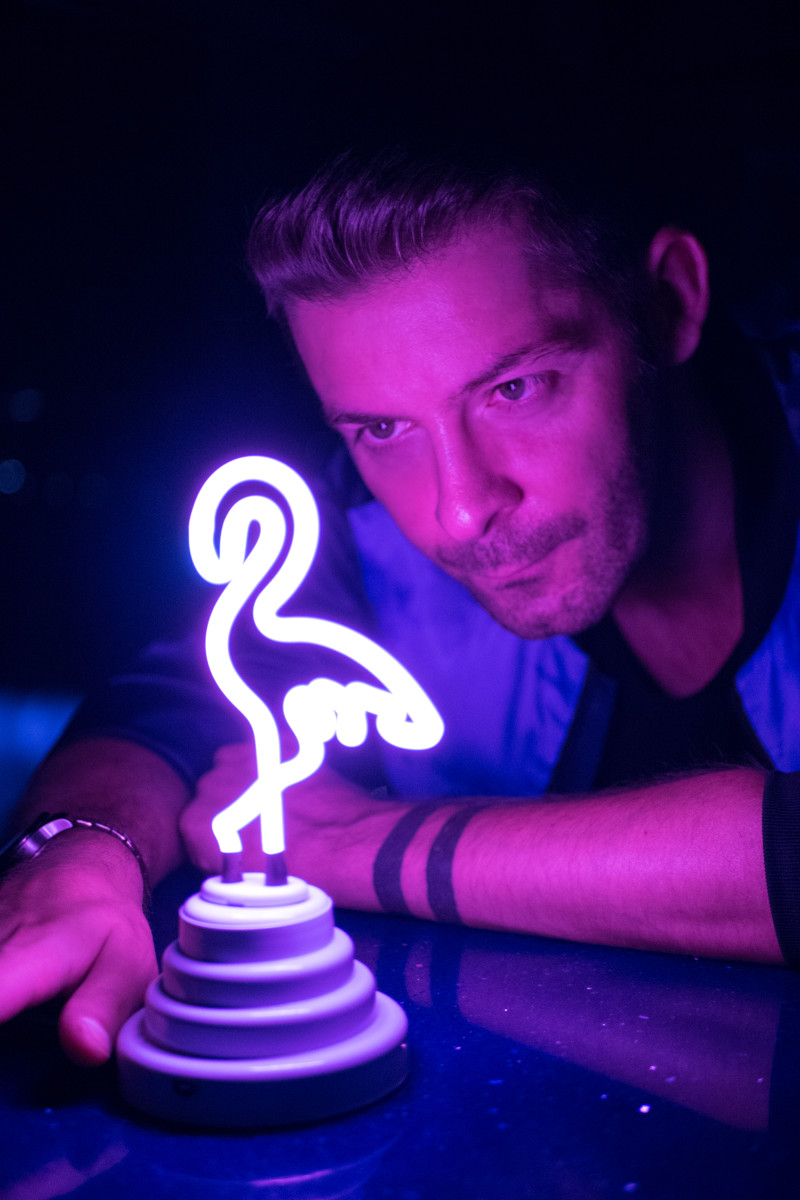
Andrew:
Piggybacking onto my last question. What was it about Synthwave music that drew you in?
Michael:
It was immediately familiar but also a fresh take on an old sound with modern production values. The nostalgia element is a big thing in Synthwave music for sure. The other big thing is that there are original songs coming out in the scene that are defining new artists and allowing the scene to evolve. For me when I started writing California and discovering the Synthwave community made me feel like I finally had a place where my music would be appreciated and not seen as some gimmick or passing fad.
Andrew:
As an artist, which artists have been your biggest inspiration and why?
Michael:
Pet Shop Boys: My favorite 80s act hands down. When I first heard them I was literally obsessed and bought all their albums, 12” singles to hear all the b-sides and different mixes of their songs. I feel like a large part of my sound unwittingly has been defined by their first few albums. I love the sounds they used and spent hours and hours as a kid trying to recreate their sound.
Ulrich Schnauss: My favorite modern artist. Every time I let people unfamiliar with him hear his music, they are always blown away. His beautiful Electronic soundscapes and unique synthesizer sounds are unparalleled. He taught me a lot about layering sounds together and using long decay digital reverbs to get a very atmospheric, moody symphonic sound. I implore you to check out his music.
Andrew:
What does your process look like? How do you go about creating your music?
Michael:
The first thing I do is try to set a mood. So, when I open up my DAW to start something, I’m usually flicking through patches on Omnisphere, Reveal Sound Spire, or Nexus 3 to shortlist sounds that evoke whatever mood I’m in and also compliment each other. I guess you could call that getting my palette of sounds together to work with. From there the mood usually pulls me in a direction musically and I’ll start to lay down compositional ideas.
The melody line and lyrics I sing don’t come until later once I have a draft of what I’ve been working on finished to sit with because I find the words and melody come to me rather than me trying to find it. It’s almost as though someone else is whispering in my ear telling me all these ideas and I just have to have a pen and paper handy and write down what I get. That’s not to say that I get the full song in one sitting but rather jigsaw pieces/fragments. A line or two, a word or phrase which gets me thinking down the road of what I’m trying to say in the song.
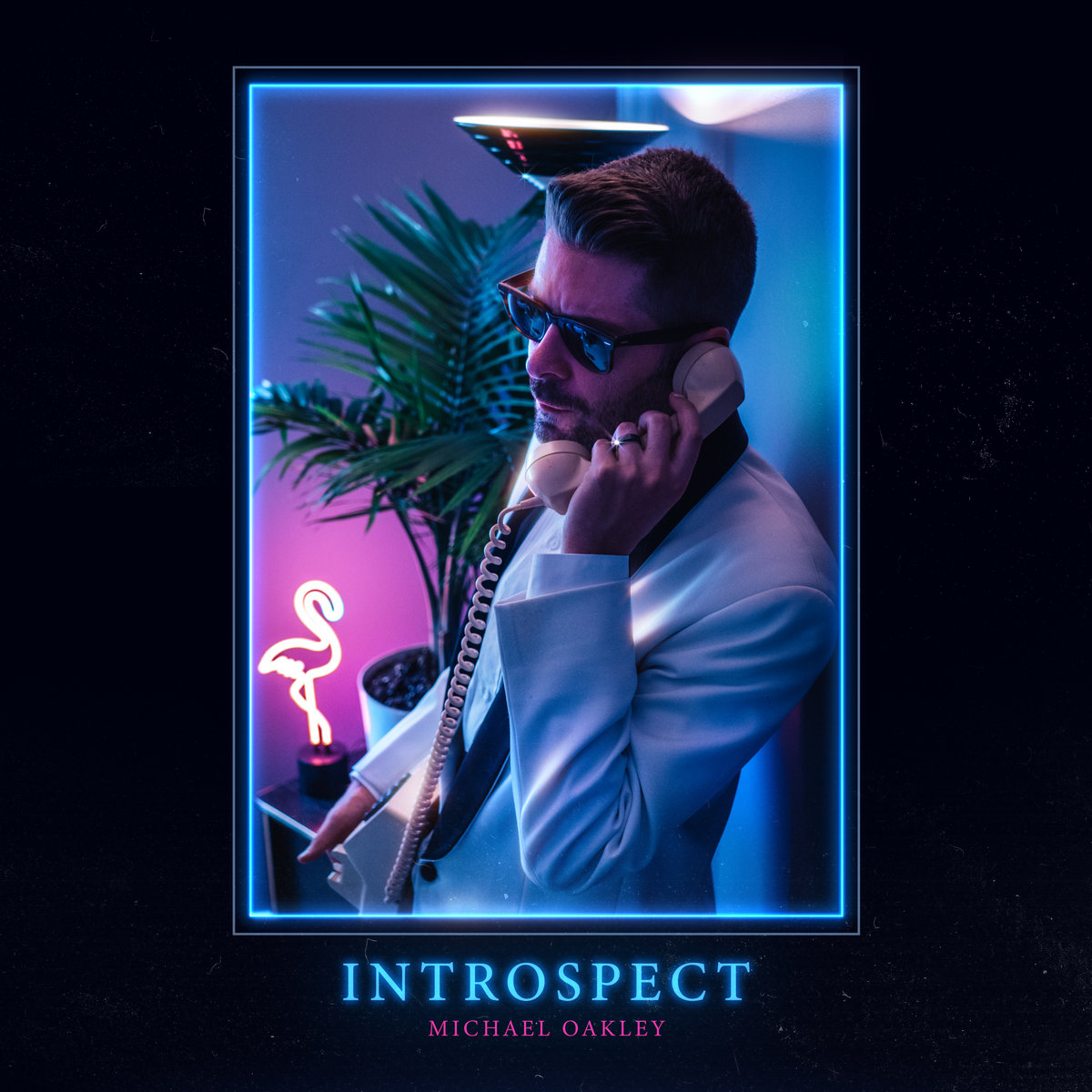
Andrew:
I wanted to talk about California for a moment. Such a great record. What can you tell us about the recording and the inspiration for it?
Michael:
Thanks! California was very much written from the bottom of a broken heart. Every song on that album is a love song. Either about a love I had lost, was trying to find, or had found but was confused and insecure about. At the time, I had no idea what that album would become and how it set me off on an amazing journey that I’m still on to this day. I just remember that period being a very dark, unhappy time in my life, and writing those songs on California was a cathartic experience that helped me move past it all.
Andrew:
Moving on to Introspect. How do you feel you’ve evolved with this release? Are you working on anything new?
Michael:
Introspect is an interesting one because when I finished California, I had a feeling that my sound was going to move in a slightly more modern direction, but then I had the idea of making an album that musically sounded more Synthpop and a part tribute to the music I grew up listening to as a kid. More authentically 80s sounding with shades of Italo Disco, I guess. So, there was that side of it and I also felt that if I was ever going to do an album like that, then it was the right time to do it.
Currently, I’m almost finished with my new album which is due out before the summer of 2021. I’m very excited about it, and It’s definitely more of a modern take on my sound but equally a natural evolution from my previous work. I never like to repeat the same sound twice in my music and part of the thrill of making music for me that keeps me interested is the possibility of creating a completely different sound with each song. This new album was written over a longer period of time (2 years), so I’ve really taken my time to develop the sound I was looking for. Collaboration has been a big part of this album too, and I’ve been working with Ollie Wride, The New Division, Mecha Maiko, Brothertiger, Dana Jean Phoenix, and Michael Cassette to help take my ideas into something much bigger and better than I could have on my own.
Andrew:
Let’s talk about the state of the music industry a bit. What are a few things you would like to see change for the betterment of both the fans and artists alike? What’s the Synth scene look like these days? It really seems to be booming in the UK.
Michael:
I think that the music industry has changed into a subscription-based model, where people aren’t buying albums anymore and stream music until they find something they like. Kind of like tapas, where you pick and choose what you want on your plate. The problem though is that the royalty rates artists are getting back from platforms like Spotify and Apple Music are terrible. It’s a business model which makes it very hard for independent musicians to earn a living and allows them to continue growing and developing in. It’s also on the consumers who use these platforms to care more about how smaller artists they like are being treated under this model because for good quality, meaningful art to continue at grassroots level they have to be paid fairer. Or no more music will come from these artists you love.
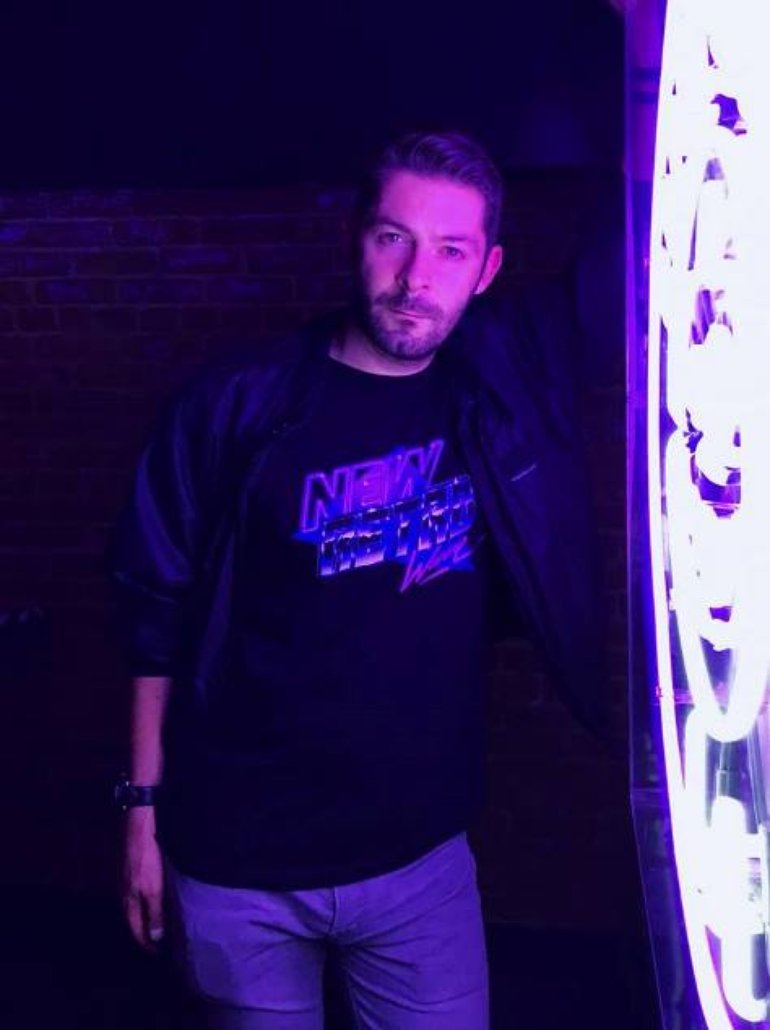
Andrew:
Opinion question: In a world dominated by capitalism and social media, can indie artists really, truly get ahead? How do we keep the playing field level so that everyone has a chance to succeed?
Michael:
Well…now you have to be more than just a musician. It’s not enough to ONLY make good music. You have to be your own manager, PR, and accountant, and that is time-consuming. I still think that great music always breaks through regardless although that relies on who you know and how good you are at getting to know the right people. Networking skills are a universal principle. As the game changes, you have to adapt and change to keep on top of it. Also, every success story has a struggle element to it, right?
Andrew:
What other passions do you have? How do those interests inform your music, if at all?
Michael:
I love playing video games! Currently playing Hitman 3, Dying Light, FIFA 19, and also Diablo 2. Also, spending time with my wife and 4 cats!
Andrew:
Are you into records? Tapes? CDs? Digital? Where do you like to shop for music? How big is your collection these days?
Michael:
I used to be, but I don’t like having too much stuff or mentally, I feel overwhelmed and need to get rid of stuff. So I listen to music currently through Spotify (Yes I know I’m a hypocrite after an earlier answer!) but it really is the easiest way to listen to new music and make playlists to collect what I discover in one convenient place.

Andrew:
What are a few albums that mean the most to you, and why?
Michael:
Jimmy Webb – Ten Easy Pieces: My desert Island disc which is the most beautiful album of piano and vocal versions of songs written by Jimmy Webb but made famous by other artists like Frank Sinatra, Glen Campbell, and Art Garfunkel. It’s beautiful and reveals the songs in the genius, emotive and honest way they were intended.
Depeche Mode – Black Celebration: My favorite Depeche Mode album and the one which first shows them and their sound fully realized in what would reveal itself on future albums. It’s dark, moody and atmospheric and has so many huge hits and wonderful synth sounds. It’s also the last album they did with Daniel Miller as producer/engineer.
Ulrich Schnauss – Goodbye: It’s hard for me to pick a favorite of his but if I had to, this would be the one. I love the underwater sound it has and how understated the sounds and production are. I spent a long time trying to recreate some of the textures he created on this album…unsuccesfully I might add!
Andrew:
Two-part question. Where do you see your music going in the future and how do you stay inspired creatively?
Michael:
That’s too tough a question to answer because I’m very spontaneous and I can change my mind on things moment to moment. I can be working on one song than a month later be working on something completely different sounding, and not understand how they would work together on an album, but then when I have 6 or 7 songs finished, then I can see them all overall as one uniformed collective album that does work together. I’m always working on something though.
I stay inspired by listening to new music, and also making a point of not listening to Synthwave music when I’m being creative in order to pull outside influences into my music, so I can create something fresh and unique to my ears and hopefully the listener.
Andrew:
Last question. You’ve maintained a strong DIY approach thus far in your career, which is never a bad thing. That being said, what advice would you have for artists just getting started?
Michael:
1. Invest in yourself and if you’re struggling financially then beg, steal and borrow to get the recording tools/software you need to start being creative. Don’t settle for less than you and your music deserve.
2. Always be working on something and if it’s not working, don’t get too attached and start something new until you find that idea that get’s you excited. You know when you know. By doing this, you sharpen your intuition and musical compass that will help you shape what YOUR sound is.
3. Let other people in. Don’t be afraid of collaboration or working with other people to help lift what you’re doing to a higher level. If you are good at composition and arrangement but not good at mixing then find someone with the right skill set to help you.
4. Don’t allow yourself to get too precious about your own ideas on how your music sounds or should sound. Keep an open mind. All feedback and suggestions from other people help you decide what’s best for your music (Even when you don’t agree with them, this helps to reinforce your opinion). So, always stay open.
5. You’re going to encounter rejection. That’s okay. Not everything you do connects with people but the right people are out there who will connect with your music and respond positively and give you good feedback. Stay patient and don’t get frustrated. Your focus should be on trying to make the highest quality music because that’s ALL you have control over. You don’t have control over other people’s opinions and you can’t talk someone into liking your music, but you always maintain control over the quality of your music. So keep pushing for the best versions of your songs and don’t settle for anything less than that.

Interested in diving deeper into the work of Michael Oakley? Check out the link below:
Dig this interview? Check out the full archives of Vinyl Writer Interviews, by Andrew Daly, here: www.vinylwritermusic.com/interview
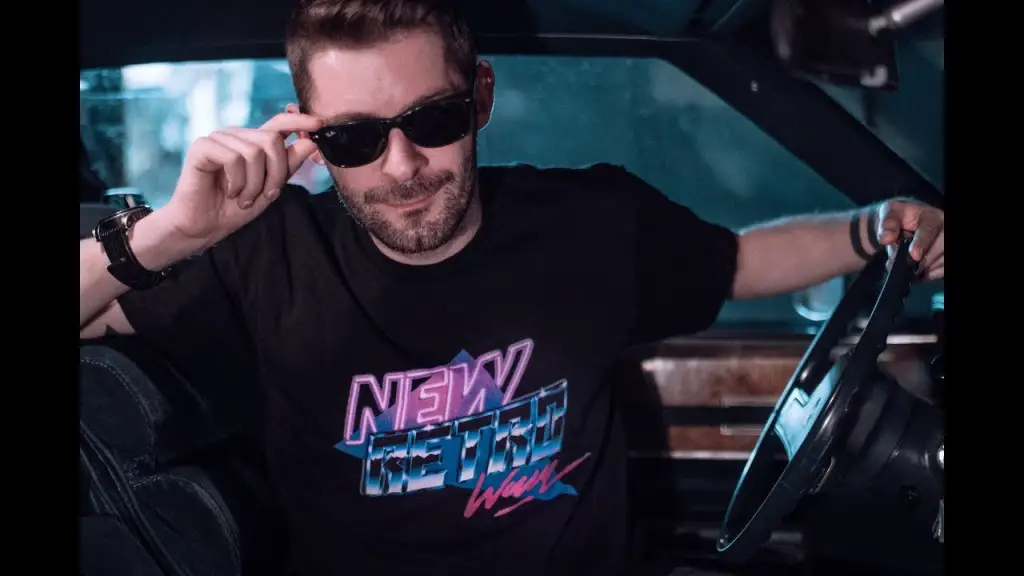




Leave a Reply